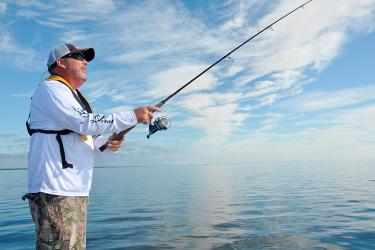This fall, young adults from all five Gulf states converged in Weeks Bay, Alabama to kick off the GulfCorps program’s third year with a week of orientation. This conservation corps program provides young people jobs and training through hands-on natural resource restoration projects benefiting habitat, fish and wildlife impacted by the 2010 Deepwater Horizon oil spill. From building reefs for oysters, to restoring barrier islands protecting juvenile fish habitat, the GulfCorps program is helping create resilient Gulf environments and communities.

The week gave 105 young adults the opportunity to learn together and bond with future team members. They’ll be spending the next 7 months working to improve resources in the region and states they came from.
They started with training sessions on the history of the Deepwater Horizon oil spill and its impact on the coastal ecosystem. Then, corpsmembers were introduced to topics on conservation and restoration, being a corpsmember, leadership, and teambuilding. By midweek, they focused on field work, including data collection, field monitoring, and invasive species control. Later, they put their new skills to the test during a day of field work with their newly-formed crews.
A highlight of the training was invasive species management techniques taught by local experts—which are used at all project sites. Invasive plants have no natural counterparts to keep their populations in check. They can quickly dominate habitat, disrupting nature’s checks and balances. Removing invasive species and planting native species helps bring back the balance, benefitting migratory fish and other wildlife.

Orientation closed with a day developing job readiness skills. This helps ensure each corpsmember finishes the program ready to network and pursue future employment or academic opportunities.
In the classroom and out in the field, orientation participants shared their personal journeys into GulfCorps. Accounts of successes and challenges helped remind these young adults that everyone starts their career paths from a place of interest, and builds from there. With a week of intense team-building and training under their belts, corpsmembers returned home excited. They are looking forward to the year ahead—which will be full of opportunities to restore the Gulf coast.
Looking forward, crews will receive advanced trainings and gain certifications to further increase restoration skills as they begin work with partners at project sites. The first and second years included almost 150 corpsmembers working more than 80,000 hours to restore coastal habitats. Past participants have gone on to find employment in related fields. Others advanced into academic programs or returned to the program as advanced crew members and leaders.

Funded by the RESTORE Act, GulfCorps was launched in 2017. It is led by NOAA, The Nature Conservancy, The Student Conservation Association, and The Corps Network. The goal of the program is restoring habitats damaged by the Deepwater Horizon oil spill, while also restoring the economy of the Gulf states. It provides experience and hands-on job training through short-term employment performing a range of conservation and restoration projects on local, state and federal lands and waters.



